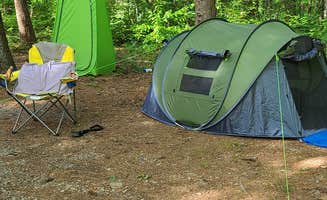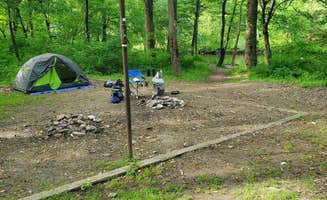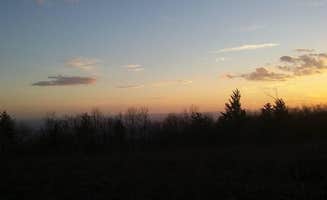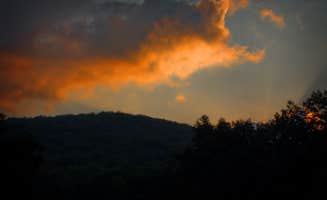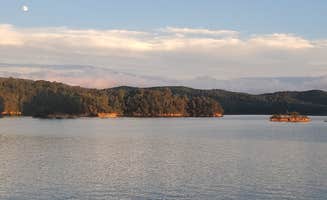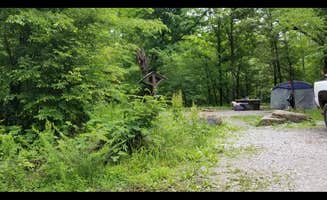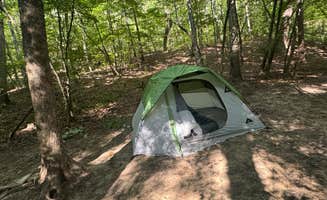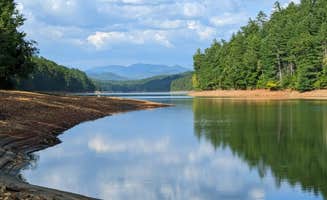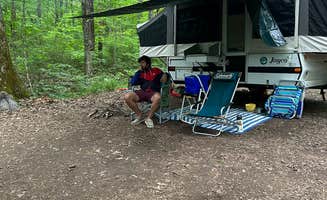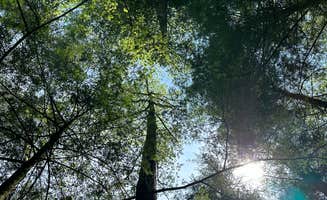Primitive camping near Cisco, Georgia offers campers access to the Cohutta Wilderness and Cherokee National Forest across elevations ranging from 1,800 to 4,000 feet. Most sites sit along creeks or rivers with notable temperature variations between valley floors and mountain sites. Forest roads leading to dispersed camping areas typically require 7+ miles of gravel road travel with potentially challenging conditions after rainfall.
What to do
Nighttime astronomy: Ball Field Dispersed Camping Area provides exceptional stargazing opportunities. "This is one of my favorite types of spots: remote, little light pollution, and deep in the mountains. I searched on terrain maps for some of the best south facing skies for a great view of the belt of the milky way. Go here on a new moon night in the summer and you're sure to have a great night of uninterrupted beauty!" reports Tyler J.
Creek exploration: Goforth Creek Campground A offers excellent water access for cooling off. "The hike up the creek is really beautiful and a much less traveled trail than others in the area. I highly suggest going all the way to the end and taking a little dip. The water feels wonderful on a hot summer day," shares Asher K.
Wilderness backpacking: Jack's River Falls Trail/Cohutta Wilderness Backcountry Group Camp provides challenging backpacking experiences. "This is a tough trail but good for teens looking to challenge themselves in the back country. The views are amazing with rock falls. Camping is primitive as back country can be but worth the trek," notes Anna R.
What campers like
Creek access: Big Creek Primitive Camping Area features multiple campsites along flowing water. "There are about 7 spots here with most of them each able to hold multiple vehicles and set ups... There is hiking in the area and there are areas in the creek deep enough for wading and soaking," explains Steve V.
Natural isolation: Lost Creek - Cherokee NF offers secluded camping experiences. "This campground is incredibly clean + quiet—and completely free. It's in the middle of nowhere (7 miles down a gravel forest road), surrounded by forest, with easy creek access (some sites are right beside the creek), and the Benton McKaye trail running directly beside it," writes Brittany S.
Wildlife viewing: Camping in the Cohutta Wilderness provides opportunities for wildlife observation, though proper precautions are necessary. "This is also bear country, so you need to practice bear safety with your food and trash. We did not see any bears in camp, but did spot one just down the road the morning we were leaving," cautions a camper at Big Creek Primitive Camping Area.
What you should know
Road conditions: Access to primitive camping requires careful vehicle planning. "This is along Forest Service Road 221 which this section of FS 221 shares driving trails such as the Big Frog Loop, the Georgia Traverse, and the Trans America Trail (TAT), so there could be lots of traffic with overlanders, adventure bikers, and off-roaders," notes a visitor to Big Creek Primitive.
Seasonal considerations: Summer provides optimal swimming conditions while spring and fall offer milder temperatures. "The creek can be used for shallow water wading or fishing. During our visit in Mid January there were no other visitors at the campground," reports Gregg G. about Lost Creek.
Limited facilities: Conasauga River Camp features minimal amenities like most dispersed sites. "Lovely little spot next to a very swimmable and warm crystal clear river - very popular with locals, and I imagine would be packed on weekends. Accessible easily from a 2WD just off of a long gravel road," shares Grayce F.
Tips for camping with families
Group-friendly sites: Several areas accommodate larger family gatherings. "Great group campsite not far from Jack's River Falls. We had a group of 10 that spread out over this little 'island' very easily. There were two campfire areas already in place and most sites very level and well covered by trees," notes Renee B.
Seasonal crowd management: Weekday camping offers more solitude than weekends. "Can be crowded on the weekends. Right on the river and pit toilets close by," warns Bob P. about Conasauga River Dispersed Campground.
Water activities: Natural swimming holes provide family recreation opportunities. "There are spots that you can swim around in," mentions Scott E. about the creek at Lost Creek Campground, though he cautions that hunting season brings "too many dogs running around and barking throughout the night."
Tips from RVers
Site selection: Small trailers and tent campers work best at most primitive sites. "We had 3 vehicles (two with rooftop tents and one with a small teardrop trailer) and we still had room for more set ups in the spot we set up in," reports a camper about Big Creek Primitive.
Leveling challenges: Bring leveling blocks for uneven terrain. "The field is fairly sloped, so you want to have some shoring if you are in a trailer, roof top tent, or van," advises Steve V. about Ball Field Dispersed Camping Area.
Water supply: No potable water exists at most sites, requiring self-sufficiency. "There is no potable water available from a spicket and no Verizon cell reception," notes Gregg G. about Lost Creek, emphasizing the need to bring all necessary water supplies.


